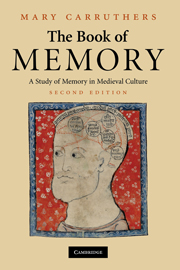Book contents
- Frontmatter
- Contents
- List of Illustrations
- Preface to the second edition
- List of Abbreviations
- Introduction
- CHAPTER 1 Models for the memory
- CHAPTER 2 Descriptions of the neuropsychology of memory
- CHAPTER 3 Elementary memory design
- CHAPTER 4 The arts of memory
- CHAPTER 5 Memory and the ethics of reading
- CHAPTER 6 Memory and authority
- CHAPTER 7 Memory and the book
- Appendix A
- Appendix B
- Appendix C
- Notes
- Bibliography
- Index of manuscripts
- General Index
CHAPTER 2 - Descriptions of the neuropsychology of memory
Published online by Cambridge University Press: 05 January 2014
- Frontmatter
- Contents
- List of Illustrations
- Preface to the second edition
- List of Abbreviations
- Introduction
- CHAPTER 1 Models for the memory
- CHAPTER 2 Descriptions of the neuropsychology of memory
- CHAPTER 3 Elementary memory design
- CHAPTER 4 The arts of memory
- CHAPTER 5 Memory and the ethics of reading
- CHAPTER 6 Memory and authority
- CHAPTER 7 Memory and the book
- Appendix A
- Appendix B
- Appendix C
- Notes
- Bibliography
- Index of manuscripts
- General Index
Summary
All accounts of the workings of memory written after Aristotle separate its activities into two processes: that of storage (in a strict definition, the activity to which the words memoria and mnesis are applied); and that of recollection (reminiscentia and anamnesis). In broader and more common contexts, memoria refers to both storage and reminiscence. Indeed, when described as an aspect of rhetoric, it refers to training and discipline in a whole craft of memory, ars memorativa, comprising techniques for storing a memorial inventory that are designed to facilitate more productive recollection. Though the two activities are closely related, the one being dependent upon the other, for clarity’s sake it is best to follow ancient example and discuss memoria, at least initially, separately from reminiscentia. Thus, this chapter is concerned first with the nature of memory-storage, of what is stored and how, and then with the question of what recollection is and how it was thought to proceed.
A caveat to this method of proceeding is in order. The monastic traditions of the early medieval centuries in the West are not primarily concerned with those definitional problems that later occupied the scholastic philosophers, but are directed towards the practice of meditational prayer. G. R. Evans has noted that “[t]he notion of memory poses a variety of problems which seem to have held few attractions” for pre-scholastic scholars. This is not because they neglected their memories, but rather because memoria was thought of as the praxis of liturgical and devotional prayer, as I demonstrated in The Craft of Thought. Thus, while there are virtually no medieval treatises de memoria much before the twelfth century, there are a number of writings on prayer, meditation, and the study of Scripture, which employ some basic features of practical memory-work that we find also in antiquity, without evidencing much (if any) interest in memory and recollection as philosophical concepts. Yet the psychological descriptions of memory and recollection, most fully articulated by Aristotle and his heirs, account for certain basic themes in medieval practice and for some of the terms used in rhetoric to discuss memoria, such as the notion of places, the importance of images, and the somatic–aesthetic emphasis given to the workings of memorial storage and recollective procedure.
- Type
- Chapter
- Information
- The Book of MemoryA Study of Memory in Medieval Culture, pp. 56 - 98Publisher: Cambridge University PressPrint publication year: 2008



